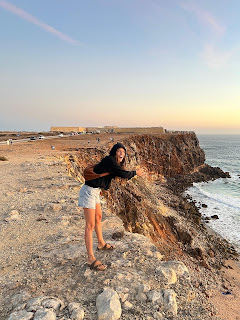The original version of this story is missing—at least it hasn’t been published yet—but it’s carefully guarded in a folder on my old PC. In this version, I’ll try to be more restrained, less emotional, and focus on unraveling all the tangled memories.
One year. Twelve months in Lisbon.
The longest stretch I’ve been away from home. At first, it was tough, I won’t deny that. But now, it feels like it was meant to be. Like a character from one of those romantic movies, I write while walking in the rain. Damn Lisbon in October. I write and walk, without using the navigator. I must have walked this street a hundred times, back and forth, from home to Graça, from my bed to the Botequim.
I’m walking now near Desgraça, the first social center I discovered here—raw, gritty, alive. Lisbon is full of these spaces, where ideas are traded over a one-euro beer. It’s still raining. I never bought an umbrella, even though winters here can be relentless. “It’s always raining,” they say, and this time, they’re right.
To my left is the cheapest Nepali restaurant in town, Sabor do Nepal. Inside, three Ikea paintings still hang, unwrapped, as if waiting for something. One is a terrifying clown. The walls are painted in loud reds and blues. It was my first Nepali meal in Lisbon. This city is full of places to eat—at a Tasca early in the month, or at an Indian or Thai spot when money runs low… And halal kebabs in Intendente at 4 a.m., all month long.
The 28E eléctrico rattles by, almost soaking me. It’s packed with tourists, even now, in this weather, at this hour. Tourists are always around, and once, I was one of them. But that feeling has faded; for months now, I haven’t identified as a tourist. My parents, my friends, everyone who’s visited—they were tourists, though. I became their guide, showing them around, discovering something new with each group, each time a little amazed, and each time feeling a small pang of regret because the last visitors “missed this.”
I’ve traveled plenty, driving across southern Portugal, exploring those stretches untouched by mass tourism. I woke up to the wild beaches of the Costa Vicentina. I love that place, and the thought of going back one day stays with me, like a promise.
The rain is pouring now, a full storm. I stop under an awning, waiting it out. Next to me, two guys are speaking German, eating ice cream. Lisbon is such a melting pot of lives, people, and cultures. From the young ones chasing their dreams to the elderly Portuguese men who have lived here all their lives. The old men in hats, jackets, and with canes—they’re my favorites on the 747 bus that takes me to work every morning.
Starting work in a new place, not knowing the language, was hard. It was my first time in a school. Just weeks before the end of my project, I realized how far I’d come. Could I have done things differently? Certainly. The early months were difficult; not being able to communicate forced me to live mechanically. Every day felt the same—going out, heading to the Padre Cruz neighborhood, entering Crescer a Cores, doing my tasks: helping, cleaning, playing with the children, helping them take care of themselves, and then cleaning again. It was mechanical, like factory work. Like Charlie Chaplin, lost in thought while chaos happens all around. I could have been bolder, sooner. But I’m glad I am now.
In these last few months, I’ve become more involved, more dynamic, eager to make the most of this opportunity. The responsibilities I’m given now are rewarding, though sometimes overwhelming. Still, I’m happy with what I do.
Lisbon isn’t a city just to be looked at—it’s a city to be lived. It can be so quiet in the winter months, but it bursts to life with summer’s arrival. June. The Santos Populares and endless nights in Graça and Mouraria.
The rain is easing up. It’s time to move on. In Largo da Graça, you can see the road leading up to Alfama. Damas is up there, one of the first places I went dancing. I’ve danced so much in Lisbon—more than anywhere else, with more intensity, for longer hours. I’ve danced to everything: funk, samba, Portuguese music, electronic beats, house, commercial tunes, even powerful rave music.
I turn the corner and arrive at the Miradouro de Graça. You live Lisbon in the streets, but it’s from up here, looking down, that you truly fall in love with it. The Miradouro da Senhora do Monte at night offers a breathtaking view: starting from the left, you see the Castelo de São Jorge, the Tejo, the lights across the river, the Ponte 25 de Abril, and Martim Moniz plaza. All so mismatched, yet so beautiful.
My friends are waiting for me now. There’s sure to be a liter of Vinho Verde and a tosta 3 queijos (that tastes only of garlic) ready for me. What a heavy combo. Tomorrow, I’ll need to wake up for work at Bairro Padre Cruz. Thankfully, one of my roommates will take on the task of waking me.
In many ways, my time in Lisbon can be summarized by this walk—from home to Graça, from my bed to the Botequim. The only street without steps.
Now, the rain falls only from the balconies above. I reach my group—volunteers, friends, lovers, and fellow travelers. My evening begins here.
I go.
Bye, baci stellari,
Ele







